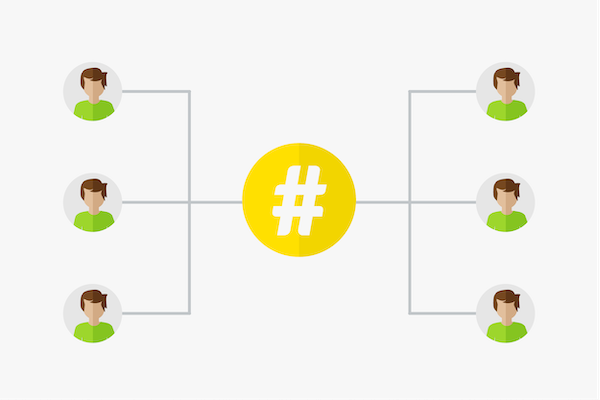Social Tagging
Social tagging is a process in which online content is individually tagged with keywords so that it can then be searched and used by other users. The generic term for social tagging is "Folksonomy". It is made up of the English folks and taxonomy. Social tagging is also a classification carried out by humans with their own keywords.
Keywording through social tagging
Social tagging is used in particular for website content and social bookmarks, but photos are also sometimes tagged. In contrast to conventional indexing processes, the special feature is that there are no fixed rules for this keywording. Each participant can add keywords to interesting content according to his/her own logic and thus make it accessible to others. Other users can follow this logic and make their own additions on the same day. Individual tags can also be bundled into new keywords.
Definition of terms
In social tagging, web content is tagged with tags. Collections of these tags are called folksonomies. It is also possible to graphically display tags as tag clouds. The most important keywords associated with a topic are listed in the form of a cloud. The most commonly used words are written larger than others.
Use
Social tagging can be used both on traditional websites in the form of tag clouds and in social networks. One possible example of social tagging is with a hashtag. Tweets or postings with this keyword can be searched and displayed.
Social tagging is also widespread on platforms such as Pinterest and Instagram. Here, for example, users can add tags or headlines to image collections, which classify the content thematically. The same goes for photo platforms like Flickr.
Advantages of social tagging
An advantage of social tagging is that every user has the possibility to individually design and promote the categorization of useful web content. The catalogued content tends to offer a higher added value through evaluation by a person than through pure algorithmic evaluation by search engine robots. This is also due to the fact that most of the content is tagged, which you can also use yourself and whose benefits can be assessed objectively. Social tagging benefits from the large number of users, as a result of which the stock of electronic bookmarks and related tags is growing rapidly.
Social tagging allows users to view and search other users' bookmarks. If you are looking for specific information on a particular topic, social tags can help you get to the content you need quickly.
For example, the GPS data obtained from geotagging may also be used to display local offers. "Social tagging becomes social tagging by bringing people together: they get to know each other by finding other users with similar interests.
Disadvantages of social tagging
Not everything about social tagging is always beneficial. The following points of criticism must be taken into account:
- Categorisation of content under different keywords that denote the same thing (missing a common index)
- Deviating keywords due to the use of synonyms and homonyms
- Insufficient consideration of the context of a word
- Involvement of countless users enables misuse of social tagging
Significance for Search Engine Optimization
In the past, social bookmarking portals and social tagging were abused by search engine optimizers, sometimes on a large scale, in order to build up links. Once this development was also observed by Google, the results of social bookmarking portals were devalued. Due to increasing spamming, social tagging has become increasingly uninteresting for actual users. In the meantime, many bookmarking portals have stopped their service and social tagging is increasingly being forgotten in this area.
However, social tagging has regained momentum, especially in the form of hashtags and with the help of social networks. For example, hashtags are also used for large marketing campaigns.

